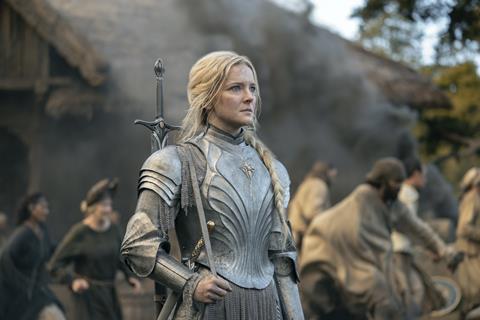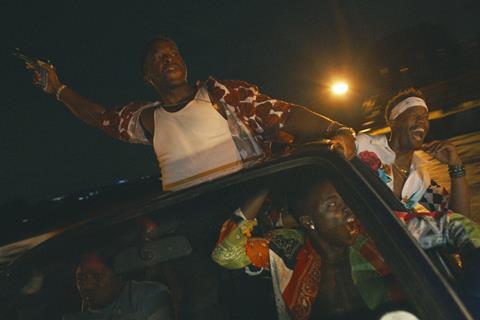The era of peak TV looks to have passed, amid strikes, economic uncertainty and buyer caution. But audience expectations for scripted shows remain as high as ever, producers and distributors tell Screen.

About 18 months ago, Sally Woodward Gentle, the acclaimed producer of series such as Killing Eve and Extraordinary, recalls thinking that the ‘bubble’ in the drama market was about to burst. “The level of spending and the number of shows felt like it was unsustainable,” says Woodward Gentle, founder of Sid Gentle. “Even I could work out that it didn’t all add up.”
Woodward Gentle, of course, was not alone in thinking the scripted TV market was in classic bubble territory. In the immediate post-lockdown period, streamers and broadcasters were racing to make fresh content after a long production hiatus. Drama was seen as the ‘genre du jour’, one that could drive up subscriptions for new platforms. Eye-watering sums were invested in series such as Prime Video’s The Lord Of The Rings: The Rings Of Power, Disney+’s The Mandalorian and Netflix’s Stranger Things. Budgets hit $12m-$15m per episode for premium series as platforms sought breakout shows like Game Of Thrones. Amid unprecedented demand, crew and facility rates spiralled and talent costs went through the roof.
Everybody in the industry realised that something had to give. The question was when.
The big slowdown
Few doubt that 2023 is the year the drama bubble popped, although the initial signs probably began in the second half of 2022. “There is a big slowdown,” acknowledges The Crown producer Andy Harries of Left Bank Pictures.
The reasons are manifold and well documented. Studios and streamers have become more cost conscious since Netflix’s historic subscriber loss last year sent share prices tumbling. For platforms, the focus now is firmly on efficiency and profits rather than subscriber growth at any cost. Runaway content spending is being reined in. Commercial broadcasters have become more cautious as ad revenue shrinks during the cost-of-living crisis. So too have public service broadcasters like the BBC, whose spending power has been eroded by high inflation.
Then, of course, there are the WGA and SAG-AFTRA strikes. The pain has been felt acutely in the US and production hubs like the UK, where three-quarters of TV and film crews are currently out of work, according to the Bectu union.
Many executives interviewed for this article think a major reset is now underway in the scripted TV sector — one that comes with plenty of challenges, but also significant opportunities for those who can adapt. “Certainly, peak TV has peaked — I think everyone would agree about that,” says Harries, referencing the now famous phrase by FX boss John Landgraf.
“We’re in a bit of chaos at the moment. But my career has always shown me that, within the chaos, there’s opportunity,” says producer and writer Dean Devlin, CEO of Leverage: Redemption indie Electric Entertainment.
On the plus side, all agree the so-called ‘Golden Age of Television’ will continue, even if the era of peak TV has passed. Audiences have become so accustomed to ambitious storytelling and high production values that there is no turning back. “The audience palette has expanded,” says Jamie Campbell, co-founder of Sex Education producer Eleven Film.
The slowdown has to be put into context too, stresses Banijay’s global head of scripted Christian Wikander. “It’s important to remember it is coming down from an extremely high level — it’s crazy how much production there has been, whether in bigger or smaller territories, English or non-English-language countries. It was everywhere.”
There is hope too that, after this painful correction period, things will start to improve next year. “The pullback feels global in 2023… Whether it is the streamers or the linear buyers, everyone seems to be feeling the pinch,” says Julie Meldal-Johnsen, executive VP of global content, ITV Studios, who adds: “Most people we speak to are hopeful it starts correcting itself and starts looking better next year.”
But the production landscape will be profoundly changed by the reset, ushering in a new era for scripted drama. Budgets will fall in real terms, as will talent and crew rates. The number of shows will likely drop too, and along with it the number of production companies. Dramas will be financed in different ways, while streamers and studios will be more flexible about licensing and windows. Certain genres of shows will be more likely to get greenlit.
Belt tightening
Many of the executives interviewed here believe that buyers will spend less money on series in the years to come, although there are different shades of opinion on how this will play out in the industry. “I think there are going to be fewer shows being made for less money,” says Woodward Gentle. “Everything we hear directly from buyers is a desire for shows that are less expensive than the ones they’ve got used to funding over the past couple of years.”
Budget levels in the UK are down from around $12.1m (£10m), she says, to around $6m-$8.5m (£5m-7m) per hour for a high-end series. “In the UK, that feels incredibly healthy, but in the States it’s verging on cheap.”
Devlin argues that the number of dramas will not drop dramatically, but budgets will. “The platforms realise they can’t have less content and expect to keep their subscribers,” he says. “But at the same time they’ve realised they can’t spend what they’ve been spending. So, we’re not going to see a lot less scripted entertainment, but we are going to see budgets shrink dramatically.”
Eleven Film co-founder Joel Wilson, meanwhile, reckons that programme budgets are flatlining or even rising slightly — but are falling significantly in real terms because of the impact of inflation. “The cost of production is continuing to go up,” he notes.
All the headlines this year seem to confirm a general slowdown in spend. At the start of the year, Ampere Analysis predicted that worldwide spend on TV content, including sport, would increase just 2% to $243bn in 2023 — the slowest rate of growth in 10 years.
Sure enough, Warner Bros Discovery has cancelled multiple series and features as well as yanking series from streamer Max that are too costly to maintain as available titles due to residuals, royalties, music licensing fees and other costs. Disney, meanwhile, has cut the overall volume of content produced for its streaming platforms — primarily Disney+ and Hulu — and is also removing existing shows to save money. Amazon has reviewed its spending on expensive original TV programming amid a broader cost-cutting push.
With budgets under greater scrutiny, the market is going to have to adjust. Talent, crew and service rates will come under pressure. “People were pricing themselves out of the market,” says Jackie Larkin, head of English-language scripted projects at Finland’s Yellow Film & TV. “There needs to be realism that each project type has a particular budget it can raise, and beyond that it’s unrealistic.”
Creative change

Alongside a slowdown in spending, many say the kind of dramas that buyers want has changed. Left Bank’s Harries talks of a more cautious scripted market: “There is much less interest in experimentation or indulging talent in the projects that they have wanted to make.”
He points to some of this year’s “entertaining and not too complex” drama hits as an indication of where the market is heading: shows like Apple TV+’s plane thriller Hijack, and Netflix’s The Night Agent and Who Is Erin Carter? (the latter produced by Left Bank Pictures).
“I would say most of them are hamburgers, maybe with a little bit of cheese on top,” says Harries, wryly recalling the famous description by Bela Bajaria, Netflix’s global head of television, of an ideal Netflix show as a “gourmet cheeseburger”, offering something “premium and commercial at the same time”.
Harries, and several other executives, say there is a swing back by the streamers towards the kinds of TV shows linear television has long specialised in making. “I think you’re going to see less of the big, big shows — unless they are absolutely sure they can crack it,” he predicts.
Commissioning briefs feel safer, confirms Woodward Gentle, who worries that the market is focusing on risk aversion rather than innovation. The pressure is on buyers to save money and to get more eyeballs for shows. “It’s shifting sands,” she says. “I don’t think I’ve felt it quite this turbulent or uncertain before.”
For ITV Studios’ Meldal-Johnsen, it feels like there is a shift towards entertaining and uplifting drama as well as fast-paced, action thrillers. Known IP and a well-known cast is also more important than ever and there is still demand for true-crime series too, she says, citing upcoming Until I Kill You starring Anna Maxwell Martin from World Productions.
Rodrigo Herrera Ibarguengoytia, VP of scripted acquisitions and co-productions at Red Arrow Studios International, predicts a return to genres like episodic procedurals and daytime dramas that were long a staple of traditional broadcasters. Echoing this point, Beta Film’s chief distribution officer Oliver Bachert says the “classic linear TV general audience content” should not be written off, and wonders if such shows might now have an easier time finding a buyer than “highly elevated, super complex” dramas.
Over at Banijay, Wikander reckons genre is back. “There has been a movement towards broader, more mainstream content,” he says, citing thrillers, crime, sci-fi, horror and comedy. Commissioning tastes, he explains, are moving towards safer bets. Wikander also notes that decision-making is being stretched out in this era of greater caution: “The journey from a pitch to a buyer giving it a greenlight is taking longer.”
The ‘safer’ bets, of course, are safer within the context of audience taste that has expanded and changed since the streamers stirred up the drama pot. “I still feel the exciting shows will be made because the audience loves them,” says Eleven’s Campbell.
Licensing and windows
When the streamers pushed heavily into drama commissioning, they did so by paying up front to acquire all rights. Going forward, many say the streamers are likely to be much more flexible about rights ownership. Instead of buying out rights to all dramas they commission, they will be more selective — paying less to take a more limited set of rights.
“We’re going to see a big return of licensing shows for a few years at a reduced fee,” says Devlin. “While the platforms will still want to own content, it won’t be what it has been. You’re going to see a much more balanced approach.”
This is good news for producer-distributor groups like Banijay, according to Wikander. “There is a conversation to be had on a title-by-title basis,” he says. “It means we are back in the game of part controlling the rights and also exploiting the rights.”

Red Arrow Studios’ Ibarguengoytia has noticed greater flexibility from streamers too. His company will launch South African drama Soon Comes Night at Mipcom; Netflix has Africa rights, while Red Arrow is selling the rest of the world.
Many executives say that both streamers and broadcasters are also likely to be more flexible about windowing, sharing content more readily and quickly with other buyers. “You already often see shows from a network broadcaster do well, then 18 months later they reappear on Netflix or Amazon and find a whole new audience,” says Harries.
That was the case for Yellowstone, whose opening episode of its first season brought in 6.6 million viewers when it aired last month on CBS. Despite Yellowstone being in its fifth and final season on Peacock and Paramount Network in the US, CBS turned to the hit drama to fill out its autumn slate amid the strikes — proving along the way that flexible windowing can deliver decent audiences.
ITV Studios’ Meldal-Johnsen says the drama market is figuring out how to do things differently. “When the going gets tough, people get innovative… that’s the exciting part of a challenging market.”
Some of the innovative thinking has caught the market by surprise, like Disney+’s decision to not air new series Nautilus and The Spiderwick Chronicles despite both being completed. They are being shopped around to find new homes as part of a cost-cutting move by Disney that places greater emphasis on content curation on its streaming platforms.
Elsewhere, Amazon unveiled its new Amazon MGM Studios Distribution division, which will sell Amazon Studios and Prime Video originals. In recent months, Warner Bros Discovery CEO David Zaslav has also vowed to open up the Warner Bros and HBO library for licensing and windowing beyond WBD platforms.
Out with tradition
Co-production will also remain an essential — and important — way to make up budgets. “Co-production is back,” says Banijay’s Wikander.
Traditional broadcaster budgets just are not enough to fund the high cost of drama these days, notes Harries. “Any producer in the UK who is producing drama for the BBC, ITV or Channel 4 has to find co-production money. Whether that’s in America or Europe, you need to be working with a distributor to sell a show.”
Finding partners amid strikes and a challenging economic environment is not easy though. Eleven Film’s Wilson insists there is still a lot of opportunities to sell shows, despite the tough market. “If you’ve got a good project that is literally undeniable — that looks and feels different — it is going to sell at some point.”
For the moment the biggest problem is uncertainty and a lack of confidence in the market. With industry in reset mode, once both strikes are fully resolved, could this be the moment when a degree of confidence returns and things improve? “I hope so,” says Harries. “All things are cyclical. We have been here before. There will be some deflation and some things to cheer about.”






![The Brightest SunScreen[Courtesy HKIFF]](https://d1nslcd7m2225b.cloudfront.net/Pictures/274x183/3/5/0/1448350_thebrightestsunscreencourtesyhkiff_312678.jpg)


















1 Readers' comment